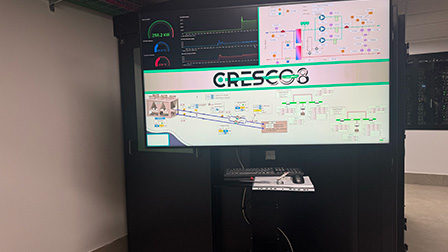Intel Celeron 2,4 Ghz

La nuova versione di processore Celeron, soluzione per il mercato entry level di Intel, dimostra come la frequenza di clock non sia che una parte degli elementi, di un moderno processore, che concorrono alla definizione delle prestazioni complessive
di Paolo Corsini pubblicato il 10 Aprile 2003 nel canale ProcessoriIntel
Celeron 2,4 Ghz
La cpu Celeron 2,4 Ghz utilizza lo stesso package esterno dei processori Intel Pentium 4; per questo motivo questa cpu può essere montata su qualsiasi scheda madre Socket 478 adatta a processori Intel Pentium 4, purché supporti la frequenza di bus di 400 Mhz.
Il quantitativo di cache L2 è il primo elemento che differenzia la cpu Celeron da quella Pentium 4: in questo processore, infatti, è pari a 128 Kbytes, 1/4 rispetto ai 512 Kbytes presenti nella cpu Pentium 4. Un secondo elemento di differenza è dato dalla frequenza di bus: 400 Mhz per la cpu Celeron e 533 Mhz per quella Pentium 4. In entrambi i casi il bus è quello Quad Pumped, introdotto con la prima versione di cpu Pentium 4 nel mese di Novembre 2000.

Da software WcpuID si possono evidenziare in dettaglio i parametri di funzionamento della nuova cpu Intel; il moltiplicatore di frequenza è pari a 24x, in abbinamento a frequenza di bus di 100 Mhz (400 Mhz effettivi per via dell'architettura Quad Pumped). La memoria DDR, grazie al chipset Intel i845PE, opera a 133 Mhz di clock, quindi in modalità DDR266.

La cache di 2° livello è integrata nel Core, in quantitativo di 128 Kbytes. Come riportato dall'utility WcpuID è di tipo associativo a 2 vie, mentre quella integrata nelle cpu Pentium 4 è associativa a 8 vie.
La tabella sottostante riporta tutte le versioni di processore Intel Pentium 4 e Celeron basate su Socket 478:
Cpu |
Bus | Moltip. | Core | Micron | Cache L2 |
| Celeron 1,7 Ghz | 400 Mhz | 17x | Willamette-128 |
0.18 | 128 Kbytes |
| Celeron 1,8 Ghz | 400 Mhz | 18x | Willamette-128 |
0.18 | 128 Kbytes |
| Celeron 2 Ghz | 400 Mhz | 20x | Northwood-128 |
0.13 | 128 Kbytes |
| Celeron 2,1 Ghz | 400 Mhz | 21x | Northwood-128 |
0.13 | 128 Kbytes |
| Celeron 2,2 Ghz | 400 Mhz | 22x | Northwood-128 |
0.13 | 128 Kbytes |
| Celeron 2,3 Ghz | 400 Mhz | 23x | Northwood-128 |
0.13 | 128 Kbytes |
| Celeron 2,4 Ghz | 400 Mhz | 24x | Northwood-128 |
0.13 | 128 Kbytes |
| Pentium 4 1,3 Ghz | 400 Mhz | 13x | Willamette | 0.18 |
256 Kbytes |
| Pentium 4 1,4 Ghz | 400 Mhz | 14x | Willamette | 0.18 | 256 Kbytes |
| Pentium 4 1,5 Ghz | 400 Mhz | 15x | Willamette | 0.18 | 256 Kbytes |
| Pentium 4 1,6 Ghz | 400 Mhz | 16x | Willamette | 0.18 | 256 Kbytes |
| Pentium 4 1,6 Ghz | 400 Mhz | 16x | Northwood | 0.13 | 512 Kbytes |
| Pentium 4 1,7 Ghz | 400 Mhz | 17x | Willamette | 0.18 | 256 Kbytes |
| Pentium 4 1,8 Ghz | 400 Mhz | 18x | Willamette | 0.18 | 256 Kbytes |
| Pentium 4 1,8 Ghz | 400 Mhz | 18x | Northwood | 0.13 | 512 Kbytes |
| Pentium 4 1,9 Ghz | 400 Mhz | 19x | Willamette | 0.18 | 256 Kbytes |
| Pentium 4 2,0 Ghz | 400 Mhz | 20x | Willamette | 0.18 | 256 Kbytes |
| Pentium 4 2,0A Ghz | 400 Mhz | 20x | Northwood | 0.13 | 512 Kbytes |
| Pentium 4 2,2 Ghz | 400 Mhz | 22x | Northwood | 0.13 | 512 Kbytes |
| Pentium 4 2,266 Ghz | 533 Mhz | 17x | Northwood | 0.13 | 512 Kbytes |
| Pentium 4 2,4 Ghz | 400 Mhz | 24x | Northwood | 0.13 | 512 Kbytes |
| Pentium 4 2,4 Ghz | 533 Mhz | 18x | Northwood | 0.13 | 512 Kbytes |
| Pentium 4 2,533 Ghz | 533 Mhz | 19x | Northwood | 0.13 | 512 Kbytes |
| Pentium 4 2,500 Ghz | 400 Mhz | 25x | Northwood | 0.13 | 512 Kbytes |
| Pentium 4 2,667 Ghz | 533 Mhz | 20x | Northwood | 0.13 | 512 Kbytes |
| Pentium 4 2,8 Ghz | 533 Mhz | 21x | Northwood | 0.13 | 512 Kbytes |
| Pentium 4 3,06 Ghz | 533 Mhz | 23x | Northwood | 0.13 | 512 Kbytes |
Tra Aprile e Maggio Intel introdurrà nuove versioni di processori Intel Pentium 4, basate su frequenza di bus Quad Pumped di 800 Mhz e dotate di supporto alla tecnologia Hyper-Threading.









 Lenovo ThinkPad X9-14 Aura Edition: leggero e sottile per i professionisti
Lenovo ThinkPad X9-14 Aura Edition: leggero e sottile per i professionisti REDMAGIC 10 Air: potenza da gaming in un corpo leggero e moderno. Recensione
REDMAGIC 10 Air: potenza da gaming in un corpo leggero e moderno. Recensione Insta360 X5: è sempre la regina delle action cam a 360 gradi. Recensione
Insta360 X5: è sempre la regina delle action cam a 360 gradi. Recensione Intel: il nuovo CEO annuncia azioni forti, ma per ora nessun licenziamento di massa
Intel: il nuovo CEO annuncia azioni forti, ma per ora nessun licenziamento di massa La missione Shenzhou-20 ha effettuato il docking con la stazione spaziale cinese Tiangong
La missione Shenzhou-20 ha effettuato il docking con la stazione spaziale cinese Tiangong Xbox Cloud Gaming arriva sulle TV LG: verifica se il tuo televisore è compatibile
Xbox Cloud Gaming arriva sulle TV LG: verifica se il tuo televisore è compatibile Stellantis: batterie allo stato solido in arrivo il prossimo anno, ricarica in 18 minuti
Stellantis: batterie allo stato solido in arrivo il prossimo anno, ricarica in 18 minuti Effetto dazi, Logitech alza i prezzi fino al 25% negli USA: non è la sola tra aumenti e fuga
Effetto dazi, Logitech alza i prezzi fino al 25% negli USA: non è la sola tra aumenti e fuga Fondazione Carisbo entra in BI-REX. Obiettivo: accelerare e incubare startup
Fondazione Carisbo entra in BI-REX. Obiettivo: accelerare e incubare startup Dal 20 giugno 2025 arriva l'eco-label UE su smartphone e tablet: cosa cambia per i consumatori e venditori
Dal 20 giugno 2025 arriva l'eco-label UE su smartphone e tablet: cosa cambia per i consumatori e venditori Ionity installerà le prime colonnine Megawatt dell'italiana Alpitronic
Ionity installerà le prime colonnine Megawatt dell'italiana Alpitronic Realme GT7 ufficiale: specifiche da top di gamma a un prezzo super competitivo
Realme GT7 ufficiale: specifiche da top di gamma a un prezzo super competitivo Firefly arriva in Europa: si parte da 23.500 euro
Firefly arriva in Europa: si parte da 23.500 euro GeForce RTX 50: se avete acquistato una Gigabyte, controllate che il gel termico non stia colando
GeForce RTX 50: se avete acquistato una Gigabyte, controllate che il gel termico non stia colando 11 bit studios ha annunciato Frostpunk 1886: un remake in UE5 che andrà oltre la grafica
11 bit studios ha annunciato Frostpunk 1886: un remake in UE5 che andrà oltre la grafica Con NUS Enterprise Volume Agreement Nutanix semplifica la gestione di grandi volumi di dati
Con NUS Enterprise Volume Agreement Nutanix semplifica la gestione di grandi volumi di dati  STMicroelectronics: risultati in calo nel primo trimestre 2025, ma il CEO resta fiducioso nella ripresa
STMicroelectronics: risultati in calo nel primo trimestre 2025, ma il CEO resta fiducioso nella ripresa


















